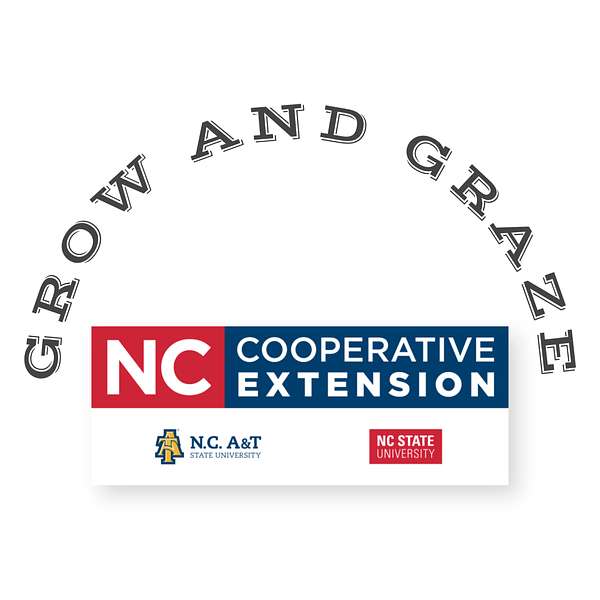
Grow and Graze
Grow and Graze
Episode 108-Becoming a Beekeeper
Use Left/Right to seek, Home/End to jump to start or end. Hold shift to jump forward or backward.
Visit go.ncsu.edu/growandgraze for links and transcripts.
Join us in chat on Telegram.
Links:
NC Cooperative Extension, Cherokee County Center
Farm Credit Service (Sponsor)
Appalachian Beekeepers Association (Cherokee County, NC)
Hello and welcome to the Growing Graze Podcast. This is episode number 1 0 8, and this is NC Cooperative Extension in Cherokee County. And we thank you for being with us today. Our topic today is going to be how to become a beekeeper in Cherokee County. And with us today we have Jim Wilcox, who is a Master Gardener. Good day.
Jim Wilcox:Hello Doug. What an exciting topic.
Douglas Clement:Yeah. You know, we had the Cherokee County Fair, last weekend, Friday and Saturday and, what peaked or interest on this was we was at a demonstration at a Master Gardener P rogram a few weeks ago and all the interest that was going on at the Cherokee County Fair so we thought we would just share with people some resources available if they wanted to become a beekeeper
Jim Wilcox:That's right, doug. There's, uh, there's a surprising amount of resources to help somebody pursue this fun hobby, and it is a fun hobby and it's a valuable hobby. Bees, as we know, are just so critical to our environment, to pollinating our, our crops and our flowers. That, uh, um, it's, it's a nice hobby. And by the way, you get honey That's correct.
Douglas Clement:Yeah. At the end, end of a, it can be a replacement for sugar that you may be using. You can, and, it can make great Christmas presents for all your family. Correct. So one of my beekeeper
Jim Wilcox:friends said, it's kind of like the lotto Jim. All of a sudden all your friends come outta the woodwork
Douglas Clement:Yeah. That's great. So, but you are right. There is a lot of resources out there. Our organization, NC Cooperative Extension, has a lot of online videos and tools. There's online beekeeping courses and the great thing about here in Cherokee County, we have the Appalachian Beekeepers Association, and they meet, once a month. I believe it's the first Monday of each month at our, uh, facility down at Koneheta Park at seven o'clock and those people are just really willing to help people get started.
Jim Wilcox:You're right. Not only are they super knowledgeable, but they're super generous in helping you learn more about this hobby. Right,
Douglas Clement:Right. And, and, you know, All hobbies do cost some money, Right. Uh, but beekeeping, compared to a lot of other hobbies, if you want to call this a hobby, it can actually become, a business. But we sure can, it can start off as a hobby, uh, is inexpensive compared to a lot of other hobbies.
Jim Wilcox:Basically, you're right, the entry costs of what you might need as far as equipment are, are not that bad. Should we just kind of blow through a quick, a few of just
Douglas Clement:Sure. Let's talk about some of those.
Jim Wilcox:Uh, you'll need the, the hive. Itself, the high body. Some of the frames, they'll have wax sheets and, and I could go into some terminology that may be confusing now, but you would learn at, uh, a beekeeper's meeting. But, uh, when I look across this, the, the smokers, even your outfit to protect you from the bees to the veil. You know, between two and$400 is, uh, a typical cost for those materials. They suggest you start with two hives, so that will get you started in, in that range.
Douglas Clement:Right? And, and once again, like we've said, there's a lot of help and assistance at these association meetings a lot of people I think, are concerned a lot of times about getting stung and certainly you can, but, these bees are like having animals once they get used to, to you. Of course you want to continue to wear your suit, but they are pretty docile, basically.
Jim Wilcox:Surprisingly docile at the, the meeting I went to and there was thousands of bees around us. Not a single one of us got stung. And uh, and the main beekeeper didn't even have a suit on
Douglas Clement:Right, so if anybody really wanted to get into this. they certainly are some, like we said, some really great resources. we'll put those in the show notes, where the Appalachian Beekeepers can, where their website's at and how they can, uh, be contacted and the information from, NC Cooperative Extension too as well. So, uh, I think that it is a very important thing to do, because, uh, without bees we would not be in very good shape. We would be in big trouble. So, but we thank everyone for being with us today and if, uh, if you have any questions for us, feel free to call us. or look up on our website and we'll be glad to help you in any way we can. And thank you, Jim, for being with us.
Jim Wilcox:So, and of course if anybody ends up with too much honey, you know, let us know. We'll be help. Happy to help you consume that.
Douglas Clement:That's right. We, we always, uh, can help with that, so, but we just appreciate everybody being with us today and thank you for listening.
Jim Wilcox:Thanks y'all.